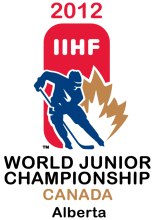CALGARY – Who will play in goal for Russia at the 2014 Olympics in Sochi? It might feel like that decision is far away, but look at the calendar: we have just over two years to go.
And you have to wonder if, after what’s unfolded at the 2012 IIHF World Junior Championship, the Russian brass is taking a serious look at Andrei Vasilevski as a potential member of their men’s hockey team for the first Winter Games ever held in Russia.
He’s only 17, but he has done a remarkable job here in Calgary for Team Russia, which is seeking its second consecutive World Junior gold medal. The 86-kg, 190-cm kid with the lightning reflexes may, in fact, be the best goalie Russia has ever used at the World Juniors. That’s with all due respect to the late Yevgeni Belosheikin and Nikolai Khabibulin. And that stands whether Vasilevski defeats Sweden in Thursday’s final or coach Valeri Bragin elects to give the start to 18-year-old Andrei Makarov.
Here’s a measure of how good Vasilevski has been: even when you factor in his two toughest outings – Sweden’s come-from-behind 4-3 overtime win versus Russia, and the 6-5 thriller over Canada where Bragin pulled him for Makarov with 5:43 left during the host team’s wild third-period comeback – the young Russian still owns the tournament’s best save percentage (95.3) among starting goalies. With a World Junior-leading 203 saves, he’s faced far more rubber than any of his peers who made it to the elimination round.
While captain Yevgeni Kuznetsov’s hat trick against Canada made headlines, Vasilevski’s brilliance enabled Russia to build its 6-1 cushion. Apart from perhaps Brandon Gormley’s power play blast that went in stick side and cut the deficit to 6-5, you really couldn’t fault Vasilevski on the goals he allowed. It was more of a credit to how the Canadians were pouring it on.
Usually at these tournaments, the Russian goaltending is competent at best. When you look back at the elimination games Russia has won or lost over the years, rarely can you say that the goalie stood on his head. In the finals that Russia has lost recently, weak goals surrendered have taken the wind out of the sails of their high-flying offence. Remember the iffy markers given up by Anton Khudobin versus Canada in both 2005 and 2006, for instance: bad-angle shots, wraparounds, and so on.
Yet instead of making Russian fans hold their breath every time the puck enters their zone, Vasilevski has projected an aura of confidence and poise overall. He has a quick glove, faces shooters squarely, and doesn’t generally give up the kind of rebounds that hard-charging Canadian forwards feast on.
It would be no surprise if Vasilevski is selected in the first round of the upcoming NHL draft. But the Salavat Yulayev Ufa prospect may well choose to hone his skills back home for at least a few years. That would give him the opportunity to go for World Junior gold again in his home rink in 2013. It would also ensure he’s available to don Russian Olympic colours regardless of the NHL’s stance on participation.
When the first Olympic puck drops in Sochi, Vasilevski will be 19 years old. He seems cool-headed enough to handle the kind of pressure that playing for his country on the world’s biggest stage would entail. And getting such an assignment as a teenager isn’t unprecedented.
In Sapporo, Japan in 1972, months before skating into the spotlight in the historic eight-game Summit Series versus Canada’s NHLers, the great Vladislav Tretiak won his first Olympic gold medal. He was 19 years old. But he didn’t fold under pressure, playing four out of five of the Soviet Union’s games under the round-robin format and posting a 2.50 GAA.
Of course, Tretiak won’t rely simply on personal nostalgia or sentiment. As the clock ticks down toward 2014, he’ll need to take a serious look at who fits the bill best in the quest to dethrone the reigning Olympic champions from Canada.
In 2009, Ilya Bryzgalov did a great job for Russia, defeating Canada 2-1 in the IIHF World Championship final in Switzerland despite being outshot 38-17. But there are legitimate concerns about whether the man with the nine-year, $51-million contract in Philadelphia has the mental discipline and consistency to deliver and Olympic gold medal.
His Flyers backup, Sergei Bobrovski, got ventilated by Canada in the 2007 junior Super Series, and didn’t receive the trust of management in the 2010-11 playoffs versus Buffalo and Boston. Colorado’s Semyon Varlamov has not shown an ability to win the big game or to stay healthy.
Come 2014, Yevgeni Nabokov and Nikolai Khabibulin will be even further past their prime – and Khabibulin, who has often declined to join the national team, last suited up at an Olympics in Salt Lake City 2002.
If the Russian braintrust is going to look to a KHL-seasoned netminder for its goaltending solution, and if Vasilevski continues to develop his prodigious talent, he just might be the chosen one in Sochi, that soon-to-be world-famous Black Sea resort.
Of course, a fine performance against Sweden in the World Junior final would go a long way toward punching his ticket.
LUCAS AYKROYD |







